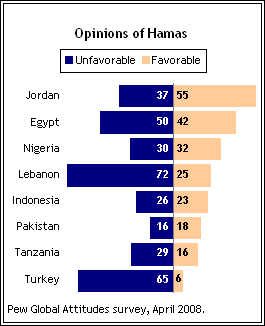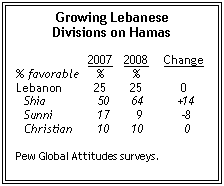by Richard Wike, Associate Director, Pew Global Attitudes Project
In the Middle East and elsewhere, Muslim reaction to the Israeli offensive in the Hamas-controlled Gaza Strip has been swift and angry, with protests in Amman, Beirut, Istanbul, Tehran, Jakarta, and several other capitals. Palestinians in East Jerusalem and in the West Bank, where Hamas rival Fatah dominates, have also demonstrated against Israel, some carrying the green flag of Hamas into the streets. However, before the current conflict in Gaza, Hamas hardly enjoyed universal popularity among Muslims, and among some key Arab publics, its support had been waning.
The 2008 Pew Global Attitudes survey found significant opposition to the organization in several predominantly Muslim countries, not to mention considerable opposition to suicide bombing — a frequent tactic of Hamas in the past — as well as deep reservations about one of Hamas’ chief sponsors, Iran. Still, given the striking antipathy toward Israel throughout much of the Arab and Muslim worlds, if Hamas survives reasonably intact and comes to be viewed as the Palestinians’ primary defender against the Jewish state, its popularity may rise.
Muslim Views of Hamas Mixed

Among the eight countries with sizeable Muslim populations surveyed by the Pew Global Attitudes Project in 2008, Hamas received a positive rating in only one, Jordan, where 55% voiced a favorable view of the organization while 37% expressed an unfavorable opinion. Still, Jordanian attitudes toward Hamas were less positive than in 2007, when 62% gave the group a favorable rating, and 36% a negative one.
Hamas’ image also declined in neighboring Egypt. In 2007, Egyptians were split (49% favorable, 49% unfavorable). By 2008, however, only 42% had a favorable opinion, while 50% held a negative view.
In general, the 2008 survey revealed few differences between men and women on this issue, although Egypt is an interesting exception. Egyptian women were divided over Hamas — 50% expressed a positive view and 47% a negative view. Egyptian men, however, tended to offer a negative evaluation — 35% favorable, 53% unfavorable.

In another Arab public included on the survey, Lebanon, the dividing line is not gender, but religion. Overall, only one-quarter of Lebanese said they view Hamas favorably, unchanged from 2007. But the overall number masks deep and growing divisions among the country’s three major religious groups. Hamas — a largely Sunni organization — received its highest ratings from Lebanese Shia, 64% of whom expressed a positive view of the group. However, just 9% of Lebanese Sunnis expressed a favorable opinion. Moreover, the division between the two Muslim sects grew sharper between 2007 and 2008, with Hamas’ image improving among Shia and declining among Sunnis. Perceptions of Hamas among the country’s Christians have consistently been overwhelmingly negative.
Positive views of Hamas are especially scarce in Turkey, where just 6% expressed a positive opinion, down from 14% in 2007. In the other four countries where the question was asked — all of which are outside the Middle East — the group is less familiar. Large numbers in Nigeria, Indonesia, Pakistan, and Tanzania are unable to give either a positive or negative assessment.
Palestinian Views of Hamas
Hamas has, of course, enjoyed a degree of popularity among Palestinians in recent years. It won a majority of seats in the January 2006 parliamentary elections, and in Pew’s 2007 survey most Palestinians (62%) had a positive view of the group, while just one-third (33%) gave it a negative rating.1 However, more recent polling, conducted in the weeks prior to the Israeli incursion, showed Hamas receiving less favorable marks than its rival Fatah, the organization headed by Palestinian President Mahmoud Abbas.
A Nov. 20-23, 2008 poll by the Jerusalem Media and Communications Center found that 37% of Palestinians would vote for Fatah in legislative elections, compared with just 20% for Hamas. In the Fatah-controlled West Bank, Fatah led Hamas by a 35-18% margin. More interestingly, Fatah also led by a 40-22% margin in the Hamas-controlled Gaza Strip. A poll by the Palestinian Center for Policy and Survey Research, conduced December 3-5, 2008, also found that Fatah was more popular than Hamas in both the West Bank and Gaza.
Turning Away from Radicalism
There are other signs that the public opinion environment in the Muslim world had been growing less hospitable to Hamas. In recent years, there has been a steady decline in support for Hamas’ most infamous tactic: suicide bombing. For instance, in the 2002 Pew Global Attitudes survey, 74% of Lebanese Muslims said suicide bombing was often or sometimes justifiable, compared with 32% six years later. Between 2004 and 2008, acceptance of suicide bombing dropped from 41% to 5% among Pakistani Muslims; and between 2005 and 2008, it dropped from 57% to 25% among Muslims in Jordan.
Another sign of disaffection is seen in the mixed reivew — at best — that Iran, widely considered a major benefactor of Hamas, receives in many largely Muslim nations. Most notably, at least half of those surveyed in Lebanon (66%), Jordan (56%), Turkey (56%), and Egypt (54%) expressed a negative opinion of Iran in the 2008 Pew Global Attitudes poll. Iranian President Mahmoud Ahmadinejad fared even worse — majorities in Egypt (74%), Jordan (71%), Lebanon (67%), and Turkey (60%) said they have little or no confidence in the Iranian leader. So to the extent that Hamas is viewed as a proxy for Iran in a regional power struggle, this may damage the group’s appeal.
Animosity Toward Israel
On the other hand, to the extent that Hamas comes to be seen as the leader of Arab opposition to Israel, this may increase its popularity. Views about Israel, and about Jews more broadly, are extremely negative in many Muslim nations, and are especially so in Arab countries.
Unsurprisingly, Muslim sympathies in the Israeli-Palestinian conflict lean heavily toward the Palestinians. For example, in Pew’s 2007 survey more than 80% in Egypt, Morocco, Jordan and Kuwait said they sympathize more with the Palestinians. The only largely Muslim country included on the survey in which sympathy for Israel reached double figures was the African nation of Mali (13%).
Attitudes toward Jews in general are quite negative throughout much of the Muslim world. Unfavorable views of Jews were almost universal in the three Arab nations surveyed in 2008 — Lebanon (97% unfavorable), Jordan (96%), and Egypt (95%). Opinions were only somewhat less negative in Pakistan (76% unfavorable), Turkey (76%), and Indonesia (66%).
In many ways, Muslim views toward Israel are also linked to perceptions of the United States. The 2007 Pew Global Attitudes poll found that roughly nine-in-ten Jordanians (91%) and Palestinians (90%) felt that American policy favors Israel too much, and more than eight-in-ten felt this way in Lebanon, Egypt, Kuwait, and Morocco.
The same survey found considerable pessimism among Arab publics about the possibility of Israeli and Palestinian coexistence. More than seven-in-ten Egyptians, Jordanians, Palestinians, and Kuwaitis believed that “the rights and needs of the Palestinian people cannot be taken care of as long as the state of Israel exists,” highlighting the fact that, even before the current crisis, optimism on this issue was rare in Arab nations.




